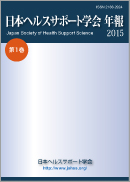【Purpose】The purpose of the long-term care insurance system is to support elderly people so that they can maintain an independent life as much as possible even if they are in need of long-term care. This purpose naturally includes increasing the possibility of staying at home as long as possible. In this study, we analyzed the factors related to admission to nursing homes for moderate and severely dependent aged people requiring long-term care at home, using the long-term care insurance accreditation data and the long-term care claim and medical claim data in one municipality in eastern Japan. We examined the conditions for advancing home care.
【Materials and methods】 We have created a database that links long-term care insurance accreditation data, long-term care claim data, and medical claim data in one municipality in eastern Japan on an individual basis. From this database, 6,540 home-based subjects who were certified as requiring long-term care 3 or higher in 2014 were extracted and tracked on a monthly basis until March 2018, and the presence or absence of nursing homes after that was checked from the long-term care claim data. Then, the status of injury and illness and the usage status of medical / long-term care insurance services at the time of the first accreditation during the analysis period were grasped from the medical claim and the long-term care claim data, and the factors related to the admission to nursing home were examined by Cox's proportional hazard model.
【Results】 Regarding factors associated with admission to nursing homes, being a woman, getting older, having dementia, needing assistance in oral cleansing, face washing, and hair washing, and being a user of outpatient care are significant higher hazards. These facotors are items that are closely related to dementia. On the other hand, the low degree of independence in items related to muscle strength such as turning over, getting up, maintaining a sitting position, standing, transferring, and moving resulted in a significant reduction in the hazard ratio of admission to nursing homes. In addition, except for the use of outpatient care, the use of other medical care services significantly reduced the hazard ratio of admission to nursing homes.
【Discussion and Conclusion】 As a result of this analysis, the factors that cause moderately severe elderly people requiring home care to enter nursing homes are elderly people, dementia and dementia related living disorders, and women. On the other hand, elderly people with high medical needs showed a lower risk of admission. This result seems to suggest that moderately severe elderly people requiring medical care may be hospitalized in medical facilities rather than special nursing homes.
View full abstract
